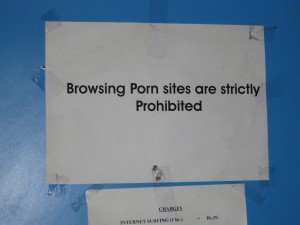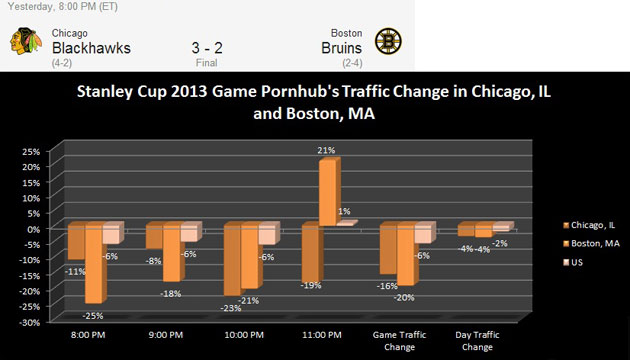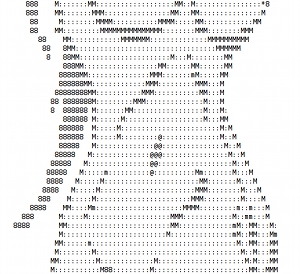Is the Internet for Porn?
 Warning posted at Indian Cybercafe: credit Kaustav Bhattacharya/Flickr
Warning posted at Indian Cybercafe: credit Kaustav Bhattacharya/Flickr
Last week, the Indian government made the controversial decision to ban several websites that allow users to share porn online. While watching pornography is not illegal in India (except child pornography), the decision has required Internet service providers to block 39 websites, most of them web forums used mainly to share and store non-pornographic files. The decision has been criticized as being an overreach by the government and as demonstrating the government's interest in regulating what people watch on the Web.
The decision is strikingly reminiscent of a similar decision made by the Chinese government in 2004. China required ISPs and websites to sign a self-disciplinary act to stamp out online pornography, and the government shut down 700 sites, arresting more than 200 people in connection with online porn. In an odd reversal of position, during the 2010 anniversary of the Tienanmen Square protests, China suddenly unblocked thousands of porn sites. Some speculated the government unblocked the sites to calm some of the discontent felt by citizens and distract them from any possible political action.China may have been onto something in using online porn to prevent riots in the street. Last week on Monday night, during the final game of the Stanley Cup, statisticians at the adult website Pornhub kept hour-by-hour tabs on incoming traffic to their site. After the Boston Bruins were defeated by the Chicago Blackhawks, Pornhub noticed a 21% spike in traffic incoming from Boston after the game, with significantly below average traffic coming from Chicago. While Chicagoans were celebrating winning their first Stanley Cup in four years, some Boston fans consoled themselves online.
 courtesy of PornHub
courtesy of PornHub
Regulating Internet pornography has been an issue in the United States since the advent of the World Wide Web, something made explicit in the short-lived 1996 Communications Decency Act. The issue of Internet pornography recently reappeared in Congress during the December 2011 debates over the Stop Online Piracy Act (SOPA) when Rep. Jared Polis entered the lyrics from a popular YouTube clip into the official record. The lyrics came from Avenue Q, a musical parody of Sesame Street, in which a woman tries to explain the Internet to a group of puppets. The clip—titled “The Internet is For Porn”—went viral on YouTube. During the charged debate, Polis declared that “a high percentage” of the Internet is used for porn and labeled the Web “a pornographer’s wet dream!”
Statistics differ on how much of the Internet is devoted to porn. In 2011, Forbes estimated that approximately 4% of the world’s websites are devoted to porn, but other estimates suggest that at least one third of all online traffic is pornography. Additionally, an ExtremeTech article last year found that the porn site YouPorn hosts over 100TB of porn and serves up an average of 950 terabytes of data transfer each day. Based on the number of visits, the largest porn site on the web, Xvideos, receives approximately 4.4 billion page views per month (which is three times the size of ESPN or CNN and double Reddit's traffic) and streams the equivalent of 10 dual-layer DVDs every second. And while most websites are lucky to keep viewers for 3-6 minutes per visit, porn sites average 15-20 minutes per visit.
 courtesy of TheNicestGuy/Flickr
courtesy of TheNicestGuy/Flickr
Porn has a long history with digital technologies and has been part of the Internet from the beginning. Before the World Wide Web, pornographic images had been sent over the Internet as ASCII art, which consisted of pictures composed of 95 keyboard characters to form a text based visual composition. Usenet groups made sharing images over the narrow bandwidth of the 1990s possible. These images were often scans of adult magazines, which could be downloaded for free, and anonymously. Even earlier, researchers developing digital scanning and laying the foundations for the JPEG format in the 1970s—funded by the Pentagon in connection with the Internet predecessor ARPANET—scanned a copy of Lena Söderberg's 1972 Playboy photo shoot. In 1997, Söderberg was even invited to be a special guest at the 50th anniversary of conference of the Society for Imaging Science and Technology in Boston. The ubiquity of her electronic photograph has earned her the title of "first lady of the Internet" from the BBC.
Among other things, the porn industry has played a key role in many innovations on the Internet that have become staples of the everyday online experience, including online payment systems, spam, streaming content, malware, live chat, pop-ups, traffic optimization, affiliate marketing, and geo-location software. In the 1990s, Penthouse magazine sponsored the development of broadband by giving away free modems.
 anaazurz/Flickr
anaazurz/Flickr
Online pornography has also influenced the development of electronic censorship and circumvention tools designed to get around censorship. In response to the Indian government's recent decision to block porn sites, the director of the Centre for Internet and Society in Bangladore, Suni Abraham, argued "I have traveled to China and Middle East and have seen that people access pornographic websites using various web tools. In fact, by banning websites the governments have made it more alluring for users to watch and access pornography." Governments clearly have an interest in regulating pornography, especially when its production or distribution takes advantage of vulnerable populations like children, but broadly blocking access to online porn may cause governments more trouble than it's worth. The Internet is widely thought of as a tool for education, economic development, and civic engagement. Given the history of online pornography, it may be worth reconsidering the idea that the Internet really is, and maybe always has been, for porn.